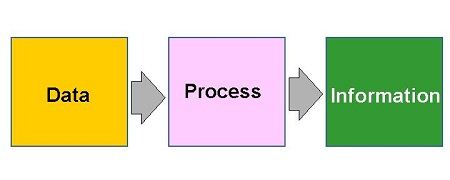Data : Data is raw facts. Data is like raw material. Data does not interrelate and also it does not help in decision making. Data is defined as groups of non-random symbols in the form of text, images, voice representing quantities, action and objects.
Information : Information is the product of data processing. Information is interrelated data. Information is equivalent to finished goods produced after processing the raw material. The information has a value in decision making. Information brings clarity and creates an intelligent human response in the mind.
According to Davis and Olson : “Information is a data that has been processed into a form that is meaningful to recipient and is of real or perceived value in the current or the prospective action or decision of recipient.”

It is a most critical resource of the organization. Managing the information means managing future. Information is knowledge that one derives from facts placed in the right context with the purpose of reducing uncertainty.
Characteristics of Information : The parameters of a good quality are difficult to determine forinformation.Quality of information refers to its fitness for use, or its reliability.Following are the essential characteristic features :
i) Timeliness : Timeliness means that information must reach the recipients within the prescribed timeframes. For effective decisionmaking, information must reach the decision-maker at the right time, i.e. recipients must get information when they need it. Delays destroys the value of information. The characteristic of timeliness, to be effective, should also include up-to-date, i.e. current information.
ii) Accuracy : Information should be accurate. It means that information should be free from mistakes, errors &, clear. Accuracy also means that the information is free from bias. Wrong information given to management would result in wrong decisions. As managers decisions are based on the information supplied in MIS reports, all managers need accurate information.
iii) Relevance : Information is said to be relevant if it answers especially for the recipient what, why, where, when, who and why? In other words, the MIS should serve reports to managers which is useful and the information helps them to make decisions.
iv) Adequacy : Adequacy means information must be sufficient in quantity, i.e. MIS must provide reports containing information which is required in the deciding processes of decision-making. The report should not give inadequate or for that matter, more than adequate information, which may create a difficult situation for the decision-maker. Whereas inadequacy of information leads to crises, information overload results in chaos.
v) Completeness : The information which is given to a manager must be complete and should meet all his needs. Incomplete information may result in wrong decisions and thus may prove costly to the organization.
vi) Explicitness : A report is said to be of good quality if it does not require further analysis by the recipients for decision making.
vii) Impartiality : Impartial information contains no bias and has been collected without any distorted view of the situation.
 Dinesh Thakur holds an B.C.A, MCDBA, MCSD certifications. Dinesh authors the hugely popular
Dinesh Thakur holds an B.C.A, MCDBA, MCSD certifications. Dinesh authors the hugely popular